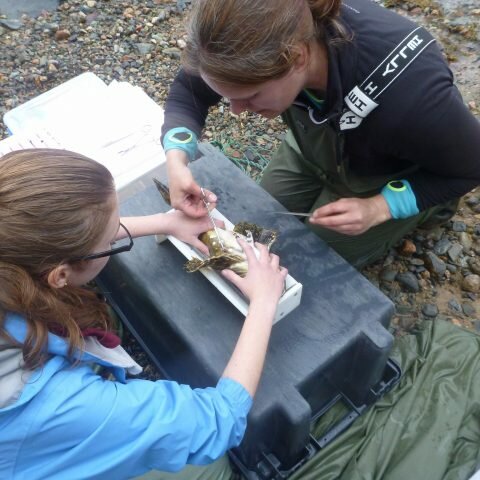
Emma Cooke, MSc Candidate
Memorial University, Department of Ocean Sciences
Bio: I love everything to do with travel and nature, but especially water – whether it’s swimming, fishing, scuba diving, boating or paddling, and I’m lucky enough to get to do some of these things while discovering what’s going on beneath the surface. My previous research looked at how freshwater protected areas can influence the evolution of fish behaviour, and now I’m looking forward to studying fish in the marine environment!
Supervisor(s): Dr. Paul Snelgrove and Dr. Bob Gregory
Start to Finish: September 2016 – September 2018
CHONe Project: 1.2.1: The contribution of nearshore coastal zone nurseries to offshore capture fisheries
Project Topic: Environmental and biological influences on Atlantic cod
Many wild fish species are being overfished around the world, which can lead to the collapse of certain populations. Unfortunately, many of these fish species are incredibly valuable not only for the ecosystem, but also for a source of food, income and livelihood for millions of people worldwide. A well known fish species that has historically been overfished is Atlantic cod in Newfoundland, Canada. In addition to overfishing, the changing environment has a large impact on cod populations. Nursery habitat, such as eelgrass, is vital for the survival of juvenile cod by giving shelter and food. As well, juvenile cod growth decreases with extreme temperatures, which lowers chance of survival during the first year of life. Juvenile cod are sensitive to both nursery habitat cover and temperature changes, both of which are critical to survival.
My project will look at how juvenile cod data can help predict adult cod populations and what environmental factors are involved. I will use seven long term datasets (22+ years) containing information on juvenile cod, adult cod, temperature, and nursery habitat cover along the coast of Newfoundland.
Atlantic cod populations are slowly rebounding, but being able to understand and predict the future status of fish populations will help plan for socio-economic impacts of low fishing years, climate change, and loss of habitat.

